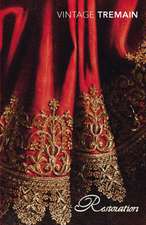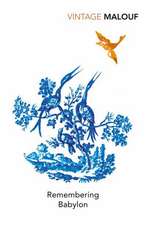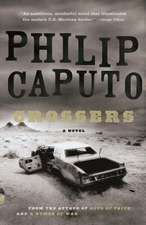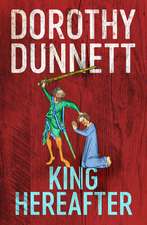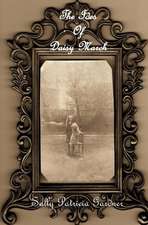To Lie with Lions: The Sixth Book of the House of Niccolo: House of Niccolo, cartea 06
Autor Dorthy Dunnett, Dorothy Dunnetten Limba Engleză Paperback – 30 iun 1999
The year is 1471. Within the circus of statecraft, where the lions of Burgundy, Cyprus, England, and Venice stalk and snarl, Nicholas wields a valued whip. Having wrested his little son Jordan from his estranged wife, Gelis, he embarks on the greatest business scheme of his life-- beginning with a journey to Iceland. But while Nicholas confronts merchant knights, polar bears, and the frozen volcanic wastelands of the North, a greater challenge awaits: the vengeful Gelis, whose secrets threaten to topple all Nicholas has achieved. Here is Dorothy Dunnett at her best. Robustly paced, prodigiously detailed, To Lie with Lions renders the quicksands of Renaissance politics as well as the turnings of the human soul, from love to hate and back.
Preț: 133.17 lei
Nou
Puncte Express: 200
Preț estimativ în valută:
25.48€ • 26.60$ • 21.09£
25.48€ • 26.60$ • 21.09£
Carte disponibilă
Livrare economică 15-29 martie
Preluare comenzi: 021 569.72.76
Specificații
ISBN-13: 9780375704826
ISBN-10: 0375704825
Pagini: 672
Ilustrații: WITH 1 MAP AND GENEALOGY
Dimensiuni: 131 x 202 x 28 mm
Greutate: 0.48 kg
Ediția:Vintage Books.
Editura: Vintage Publishing
Seria House of Niccolo
ISBN-10: 0375704825
Pagini: 672
Ilustrații: WITH 1 MAP AND GENEALOGY
Dimensiuni: 131 x 202 x 28 mm
Greutate: 0.48 kg
Ediția:Vintage Books.
Editura: Vintage Publishing
Seria House of Niccolo
Notă biografică
Dorothy Dunnett was born in 1923 in Dunfermline, Fife, Scotland. Her time at Gillespie's High School for Girls overlapped with that of the novelist Muriel Spark. From 1940-1955, she worked for the Civil Service as a press officer. In 1946, she married Alastair Dunnett, later editor of The Scotsman.
Dunnett started writing in the late 1950s. Her first novel, The Game of Kings, was published in the United States in 1961, and in the United Kingdom the year after. She published 22 books in total, including the six-part Lymond Chronicles and the eight-part Niccolo Series, and co-authored another volume with her husband. Also an accomplished professional portrait painter, Dunnett exhibited at the Royal Scottish Academy on many occasions and had portraits commissioned by a number of prominent public figures in Scotland.
She also led a busy life in public service, as a member of the Board of Trustees of the National Library of Scotland, a Trustee of the Scottish National War Memorial, and Director of the Edinburgh Book Festival. She served on numerous cultural committees, and was a Fellow of the Royal Society of Arts. In 1992 she was awarded the Office of the British Empire for services to literature. She died on November 9, 2001, at the age of 78.
Dunnett started writing in the late 1950s. Her first novel, The Game of Kings, was published in the United States in 1961, and in the United Kingdom the year after. She published 22 books in total, including the six-part Lymond Chronicles and the eight-part Niccolo Series, and co-authored another volume with her husband. Also an accomplished professional portrait painter, Dunnett exhibited at the Royal Scottish Academy on many occasions and had portraits commissioned by a number of prominent public figures in Scotland.
She also led a busy life in public service, as a member of the Board of Trustees of the National Library of Scotland, a Trustee of the Scottish National War Memorial, and Director of the Edinburgh Book Festival. She served on numerous cultural committees, and was a Fellow of the Royal Society of Arts. In 1992 she was awarded the Office of the British Empire for services to literature. She died on November 9, 2001, at the age of 78.
Extras
Chapter 1
AMONG THE RICHER class of dealers and traders, the kidnapping of the heir to a bank signifies trouble. Some investors snatch back their ducats at once, assuming that half an ear and a ransom note are about to arrive at the counting-house. Those with propositions to make do not make them. Invitations drop off. The market oscillates; the Bourse proceeds to lose bottom.
Finding itself assailed by such rumours in Venice, the Banco di Niccol? took immediate measures to quash them. Fortunately, its management was adroit. Business clients were calmed by Gregorio, the company lawyer. The well born were embraced by the handsome notary Julius, and left heartened. The heir to the Banco di Niccol?, they all learned, was aged two. And the kidnapper was the Bank's founder himself, the child's legitimate father.
The client was occasionally puzzled. 'Ser Niccol?, you say, stole away his own son?'
'Following a disagreement with the lady his wife. An irrational impulse. Ser Niccol? will tire of the boy in a week.'
'Tell me if he does,' said one client at least. 'He can have my son instead. I would pay to have the turd stolen. And meanwhile, the Bank goes on as usual?'
'As usual,' the notary Julius always agreed, tilting his classical head and occasionally smoothing the silk on his uppermost knee. 'That is, Master Gregorio will be in Venice, as always. I may have to go to Cologne.'
That was between February and March.
The news spread.
The Duchess Eleanor of the Tyrol heard the tale from a band of noble pilgrims from Venice on their way home to Bruges in the Low Countries. Their leader Anselm Adorne broached the subject. 'You will have heard. Nicholas de Fleury has disappeared. A dispute over a child. I am sure his company will keep you informed of it.'
'Nae doubt,' said the Duchess, who was Scottish. They had been hunting from her castle of Brixen. She finished feeding her dogs and, wiping her hands, picked up her embroidery. Despite her lack of youth and her girth, she was as adept in the field as she was at fending off probes about mineral rights. She said, 'And how's the wife taking it then? Glad to get rid of them baith?'
'Glad!' exclaimed Adorne's son drolly. Adorne's niece Kathi screwed up her face.
'Katelijne?' encouraged the Duchess.
'Gelis is very sad,' said the girl.
'Sad. Deary dear,' said the Duchess. 'Mind you, that's a handful, that fellow Nicholas. And you're a mite peaky yourself, my wee lass. Come to me later, and I'll find ye a potion. And how did ye manage on Cyprus? Is yon feckless lad Zacco properly married yet?'
That was in the middle of March.
The King of Cyprus, who was not properly married yet, heard the news in the third week of March, in the hills where he was hunting with leopards. Two days later, his party somewhat depleted, he rode back to Nicosia and called to the table the envoys of Venice, of Rhodes, and of all those other peoples who were immediately threatened by Turkey.
'It appears,' said Zacco, of Cyprus, 'that despite all he promised, the padrone of the Banco di Niccol? is not to fight at our side. De Fleury has fled. He has abandoned us, and his God. I cast him off. I wait to hear what you offer instead.'
The man from Cairo sighed; the Venetians shuffled; and the Treasurer of the Knights of St John muttered under his breath. The consul for Venice said, 'There is, my lord, the joy of your coming consummation with our daughter your Queen.'
In Rome, the news was handled by the Bank of Niccol?'s agent Lazzarino, who sought to present his patron's dramatic exit as an episode in a family tiff. Such acceptance as this received was then abruptly overturned by the Patriarch of Antioch, come in March with an envoy from Persia to press a Crusade on the Pope.
'Nicholas de Fleury?' roared the Patriarch, a hirsute Franciscan blessed with resonant organs. 'The self-serving Ser Nicholas de Fleury, who put the fleshpots of the West before the fight for his Church in the East? Well may he vanish. And when he materialises once more, wherever in Christendom that may be, he will find my crucifix at his jaw and my fist at his snout to change his mind for him.'
'He has taken a child?' said the Persian thoughtfully.
'Because the mother annoyed him. He himself is no more than a scab on the good name of huckstering. But of such persons the Lord can make use-with your help and mine,' said the Patriarch.
The news came in April to Scotland, where Nicholas de Fleury had several homes. The high-born ladies of Haddington Priory were especially shocked. 'A baby so young! He snatched the child from its mother and vanished! What will the poor lady Gelis do now?'
A letter from Bruges had acquainted them with the news. 'Sir Anselm declares,' said Phemie Dunbar, to whom it was sent, 'that the lady Gelis was quite wild in her despair, combing Venice for news of the boy. Sir Anselm grieved for them all, and so did young Katelijne, but they could do nothing about it. We are to give the news to Sersanders his nephew.'
'So what will the lady Gelis do now?' said Betha Sinclair her cousin.
'In her place,' said the lady Phemie, 'I should wait.'
'Obviously. M. de Fleury will tire of the child,' the Prioress said.
'No,' said Betha. 'But I'll make you a wager. When he's ready, he'll make sure his lady wife knows it. And if she wants the boy, she'll have to come to him, not the other way round.'
'How terrible!' said the youngest nun, her face rosy.
Most importantly of all, the news came that same month to Picardy, where the armies of France faced the armies of the dukedom of Burgundy across the banks of the Somme. Trivial though it might seem, the report caused each ruler to act.
The Duke of Burgundy sent for his captain of mercenaries. 'I am disappointed, Astorre. Your company is serving me well. But I am told that your patron has vanished-fled, some are saying, to the detriment of his Bank. Is this true?'
Captain Astorre had fought under better men than the Duke, including the Duke's own late father. He employed his comfortable voice. 'My lord Duke, you well know that Master Nicholas turned his back on the gold of the East in order to help you settle this quarrel with France. No doubt he or his officers will come to tell you themselves, but I can assure you of this: the Bank stands in good name, and I and my men have all the arms and silver we need to keep our bond to the Duchy of Burgundy.'
As it happened, the Duke knew this was true. It didn't lessen his annoyance with the vanished Nicholas de Fleury.
In the castle of Ham, over the river, the King of France sent for his fiscal adviser. 'You were in Venice. Indeed, my dear vicomte de Rib?rac, you have been absent these two months when we needed you. Now we hear this troublesome banker is to support Duke Charles instead of ourselves. Or has he some other patron in mind? We are told he has vanished.'
One could seldom tell, within such a volume of flesh, whether Jordan de Rib?rac was disturbed. His voice remained mellow. 'Monseigneur is well informed. M. de Fleury has left his lady wife, and wishes apparently to deny her access to their son. The situation will resolve itself. The Bank is secure.'
'We spoke of this before,' said King Louis. 'You were unable to bring me the child.'
'I have not given up hope,' said Jordan de Rib?rac. 'A banker's son reared at the Court of France might prove a jewel of some price. We speak of maintaining Lyons, reversing the Tyrol, seducing Savoy, keeping Scotland in thrall. My lord knows what de Fleury has done to our harm.'
'He may be reconciled to his wife,' said the King. 'He may have many more sons. Where is the lady?'
'Searching for him, of course,' said the vicomte. 'But I am told that latterly she has abstained from her quest, no doubt recognising that her husband cannot remain absent for ever. She is on her way to Cologne, I am told, with the company notary Julius.'
'A comely man?' said the King.
'A man who has found a fortune and a place in society through the success of the Bank. But not, I understand, an athlete of the bedchamber.'
'Perhaps his tastes will now change. Tell me again about the redoubtable M. de Fleury. He is a kinsman of yours?'
The vicomte did not sigh, but the cost of his restraint could be glimpsed. 'He is a bastard of my son Simon's dead wife. My son Simon, who keeps my castle in Scotland.'
'I remember,' said Louis. 'Then if he comes here, I expect you to bring him to see me. I speak of M. de Fleury, not your son.'
'I have sent my son to Madeira,' said the vicomte; and this time he exhaled like a jet from a pudding.
Of the three people who all this time knew where Nicholas de Fleury might be found, two had been trained to distrust him, and one was too young to hold an opinion.
Several weeks before the baby (now kidnapped) was born, Cl?mence de Coulanges had come to serve Gelis the mother, and had stayed to tend mother and baby. Convent-reared, convent-trained, Mistress Cl?mence was a lady as well as a nurse, even though her parents (report said) had neglected to wed before dying. Her elderly amanuensis Pasque was neither a nurse nor a lady, but, grumbling, fetched and carried and washed, and chivvied the wet-nurse when the time came to hire her.
Pasque was in the last resort respectful of Mistress Cl?mence, who held herself upright as a hat-stand of wood, and had been born, you would say, middle-aged. Pasque was even more in awe of her employer, the lady Gelis van Borselen, who carried her babe with the spunk of a countrywoman, even though the child was her first, and a desperate burden. It did not seem right to Pasque that the Lady's husband should stay so long overseas, and never ask for her.
It seemed downright cruel that the Lady gave birth to her fine son alone, struggling in agony hour after hour, while her husband neither sent nor tried to come till weeks after. And by then even Mistress Cl?mence knew that something was wrong, although the Lady never offered a confidence. It was Madame Margot, the Lady's companion, who told them that the lady Gelis was afraid that her husband would take against his new son, and so the boy must be hidden.
And concealed he had been, sometimes in this house or that, but always with Mistress Cl?mence and old Pasque to look after him, and his mother too, when it was safe. And it even seemed that the Lady's fears must be right, because the husband did actually come, and bring a troop of armed men to the convent, and try to torture the servants, Heaven preserve us! But the child had been taken away, and was safe, of course, with his nurses.
Then the Lady had followed her husband to the Holy Land, so they were told, to soften his heart towards her and the child. From that she had come back full of hope for the future, only to be betrayed by her so-called friend Margot. So the father, Nicholas de Fleury the torturer, had been able to kidnap the baby at last, and have his nurses brought to the ship where the child was, and demand that they serve him.
Nicholas de Fleury. Pasque would never forget the day she first set eyes on him; neither would Mistress Cl?mence, for all she planted herself on the floor of the cabin, chin up and hands clasped at her apron, as if about to complain to a tradesman. Being small, Pasque stood behind.
He was a very big man, M. de Fleury. She had seen smiths of that build, although none buttoned up to the chin in his pourpoint like this one, seated at a tidy chart-desk like a clerk, with pen and paper before him. He didn't rise. His voice, smartly outlining his proposals, alarmed her by the excellence of its Burgundian French: they had been told he was Flemish. His hair was brown like the child's, but there seemed, at first, no other resemblance that hit you. His eyes, although of the same grey, were big and fixed and bright as a drunk Marseilles monkey's. Pasque had edged closer to Cl?mence.
He said, 'I recognise you have long served my wife. I am not asking you to be disloyal to the lady, but to extend the devotion you have shown since his birth to my son. For that, I am prepared, as I have said, to improve your fees and maintain your conditions of service. If you wish anything more, you must tell me.'
'Thank you,' had said Mistress Cl?mence, in the bold way that Pasque would have called cheeky. 'A little clarification, perhaps? We are still, so far as I know, in the dame de Fleury's employment. When the child returns to her care, she may well accuse us of breaking a contract.'
'The child will not return to her care,' said M. de Fleury. Pasque shuffled.
'I see,' said Mistress Cl?mence. 'Then, monseigneur, I have to ask you what prospect we have for the future, with a broken contract behind us? What are your plans for the boy?'
'To rear him myself, with your help,' said M. de Fleury. He paused. He added, 'It is even possible that the lady my wife may join us one day. Should that occur, I am sure she would feel nothing but gratitude for your continuing care of her son.'
Mistress Cl?mence said nothing. Sometimes her silences maddened Pasque. M. de Fleury waited and then produced a curious smile. Two dents appeared in his cheeks. Pasque stared at them.
He said, 'I am buying your commitment to Jordan de Fleury, not to me, Mistress Cl?mence. Be his friend, and when the day comes to part, I shall see that you both lack for nothing. I shall write it into your contract, if you wish.'
Be his friend. Pasque grinned to herself, even as Mistress Cl?mence narrowed her gaze. Mistress Cl?mence said, 'I am a nurse. I train a child in my own way. The dame de Fleury has been pleased to support both me and my methods. I should expect the same freedom at least.'
'You would have it,' he said. The two dimples had gone.
Then Mistress Cl?mence glanced round for Pasque's nod, and said in her firm voice, 'In that case, monseigneur, we agree.' And just as she spoke, they both heard a high voice outside: a child's voice; the voice of a child calling their names.
AMONG THE RICHER class of dealers and traders, the kidnapping of the heir to a bank signifies trouble. Some investors snatch back their ducats at once, assuming that half an ear and a ransom note are about to arrive at the counting-house. Those with propositions to make do not make them. Invitations drop off. The market oscillates; the Bourse proceeds to lose bottom.
Finding itself assailed by such rumours in Venice, the Banco di Niccol? took immediate measures to quash them. Fortunately, its management was adroit. Business clients were calmed by Gregorio, the company lawyer. The well born were embraced by the handsome notary Julius, and left heartened. The heir to the Banco di Niccol?, they all learned, was aged two. And the kidnapper was the Bank's founder himself, the child's legitimate father.
The client was occasionally puzzled. 'Ser Niccol?, you say, stole away his own son?'
'Following a disagreement with the lady his wife. An irrational impulse. Ser Niccol? will tire of the boy in a week.'
'Tell me if he does,' said one client at least. 'He can have my son instead. I would pay to have the turd stolen. And meanwhile, the Bank goes on as usual?'
'As usual,' the notary Julius always agreed, tilting his classical head and occasionally smoothing the silk on his uppermost knee. 'That is, Master Gregorio will be in Venice, as always. I may have to go to Cologne.'
That was between February and March.
The news spread.
The Duchess Eleanor of the Tyrol heard the tale from a band of noble pilgrims from Venice on their way home to Bruges in the Low Countries. Their leader Anselm Adorne broached the subject. 'You will have heard. Nicholas de Fleury has disappeared. A dispute over a child. I am sure his company will keep you informed of it.'
'Nae doubt,' said the Duchess, who was Scottish. They had been hunting from her castle of Brixen. She finished feeding her dogs and, wiping her hands, picked up her embroidery. Despite her lack of youth and her girth, she was as adept in the field as she was at fending off probes about mineral rights. She said, 'And how's the wife taking it then? Glad to get rid of them baith?'
'Glad!' exclaimed Adorne's son drolly. Adorne's niece Kathi screwed up her face.
'Katelijne?' encouraged the Duchess.
'Gelis is very sad,' said the girl.
'Sad. Deary dear,' said the Duchess. 'Mind you, that's a handful, that fellow Nicholas. And you're a mite peaky yourself, my wee lass. Come to me later, and I'll find ye a potion. And how did ye manage on Cyprus? Is yon feckless lad Zacco properly married yet?'
That was in the middle of March.
The King of Cyprus, who was not properly married yet, heard the news in the third week of March, in the hills where he was hunting with leopards. Two days later, his party somewhat depleted, he rode back to Nicosia and called to the table the envoys of Venice, of Rhodes, and of all those other peoples who were immediately threatened by Turkey.
'It appears,' said Zacco, of Cyprus, 'that despite all he promised, the padrone of the Banco di Niccol? is not to fight at our side. De Fleury has fled. He has abandoned us, and his God. I cast him off. I wait to hear what you offer instead.'
The man from Cairo sighed; the Venetians shuffled; and the Treasurer of the Knights of St John muttered under his breath. The consul for Venice said, 'There is, my lord, the joy of your coming consummation with our daughter your Queen.'
In Rome, the news was handled by the Bank of Niccol?'s agent Lazzarino, who sought to present his patron's dramatic exit as an episode in a family tiff. Such acceptance as this received was then abruptly overturned by the Patriarch of Antioch, come in March with an envoy from Persia to press a Crusade on the Pope.
'Nicholas de Fleury?' roared the Patriarch, a hirsute Franciscan blessed with resonant organs. 'The self-serving Ser Nicholas de Fleury, who put the fleshpots of the West before the fight for his Church in the East? Well may he vanish. And when he materialises once more, wherever in Christendom that may be, he will find my crucifix at his jaw and my fist at his snout to change his mind for him.'
'He has taken a child?' said the Persian thoughtfully.
'Because the mother annoyed him. He himself is no more than a scab on the good name of huckstering. But of such persons the Lord can make use-with your help and mine,' said the Patriarch.
The news came in April to Scotland, where Nicholas de Fleury had several homes. The high-born ladies of Haddington Priory were especially shocked. 'A baby so young! He snatched the child from its mother and vanished! What will the poor lady Gelis do now?'
A letter from Bruges had acquainted them with the news. 'Sir Anselm declares,' said Phemie Dunbar, to whom it was sent, 'that the lady Gelis was quite wild in her despair, combing Venice for news of the boy. Sir Anselm grieved for them all, and so did young Katelijne, but they could do nothing about it. We are to give the news to Sersanders his nephew.'
'So what will the lady Gelis do now?' said Betha Sinclair her cousin.
'In her place,' said the lady Phemie, 'I should wait.'
'Obviously. M. de Fleury will tire of the child,' the Prioress said.
'No,' said Betha. 'But I'll make you a wager. When he's ready, he'll make sure his lady wife knows it. And if she wants the boy, she'll have to come to him, not the other way round.'
'How terrible!' said the youngest nun, her face rosy.
Most importantly of all, the news came that same month to Picardy, where the armies of France faced the armies of the dukedom of Burgundy across the banks of the Somme. Trivial though it might seem, the report caused each ruler to act.
The Duke of Burgundy sent for his captain of mercenaries. 'I am disappointed, Astorre. Your company is serving me well. But I am told that your patron has vanished-fled, some are saying, to the detriment of his Bank. Is this true?'
Captain Astorre had fought under better men than the Duke, including the Duke's own late father. He employed his comfortable voice. 'My lord Duke, you well know that Master Nicholas turned his back on the gold of the East in order to help you settle this quarrel with France. No doubt he or his officers will come to tell you themselves, but I can assure you of this: the Bank stands in good name, and I and my men have all the arms and silver we need to keep our bond to the Duchy of Burgundy.'
As it happened, the Duke knew this was true. It didn't lessen his annoyance with the vanished Nicholas de Fleury.
In the castle of Ham, over the river, the King of France sent for his fiscal adviser. 'You were in Venice. Indeed, my dear vicomte de Rib?rac, you have been absent these two months when we needed you. Now we hear this troublesome banker is to support Duke Charles instead of ourselves. Or has he some other patron in mind? We are told he has vanished.'
One could seldom tell, within such a volume of flesh, whether Jordan de Rib?rac was disturbed. His voice remained mellow. 'Monseigneur is well informed. M. de Fleury has left his lady wife, and wishes apparently to deny her access to their son. The situation will resolve itself. The Bank is secure.'
'We spoke of this before,' said King Louis. 'You were unable to bring me the child.'
'I have not given up hope,' said Jordan de Rib?rac. 'A banker's son reared at the Court of France might prove a jewel of some price. We speak of maintaining Lyons, reversing the Tyrol, seducing Savoy, keeping Scotland in thrall. My lord knows what de Fleury has done to our harm.'
'He may be reconciled to his wife,' said the King. 'He may have many more sons. Where is the lady?'
'Searching for him, of course,' said the vicomte. 'But I am told that latterly she has abstained from her quest, no doubt recognising that her husband cannot remain absent for ever. She is on her way to Cologne, I am told, with the company notary Julius.'
'A comely man?' said the King.
'A man who has found a fortune and a place in society through the success of the Bank. But not, I understand, an athlete of the bedchamber.'
'Perhaps his tastes will now change. Tell me again about the redoubtable M. de Fleury. He is a kinsman of yours?'
The vicomte did not sigh, but the cost of his restraint could be glimpsed. 'He is a bastard of my son Simon's dead wife. My son Simon, who keeps my castle in Scotland.'
'I remember,' said Louis. 'Then if he comes here, I expect you to bring him to see me. I speak of M. de Fleury, not your son.'
'I have sent my son to Madeira,' said the vicomte; and this time he exhaled like a jet from a pudding.
Of the three people who all this time knew where Nicholas de Fleury might be found, two had been trained to distrust him, and one was too young to hold an opinion.
Several weeks before the baby (now kidnapped) was born, Cl?mence de Coulanges had come to serve Gelis the mother, and had stayed to tend mother and baby. Convent-reared, convent-trained, Mistress Cl?mence was a lady as well as a nurse, even though her parents (report said) had neglected to wed before dying. Her elderly amanuensis Pasque was neither a nurse nor a lady, but, grumbling, fetched and carried and washed, and chivvied the wet-nurse when the time came to hire her.
Pasque was in the last resort respectful of Mistress Cl?mence, who held herself upright as a hat-stand of wood, and had been born, you would say, middle-aged. Pasque was even more in awe of her employer, the lady Gelis van Borselen, who carried her babe with the spunk of a countrywoman, even though the child was her first, and a desperate burden. It did not seem right to Pasque that the Lady's husband should stay so long overseas, and never ask for her.
It seemed downright cruel that the Lady gave birth to her fine son alone, struggling in agony hour after hour, while her husband neither sent nor tried to come till weeks after. And by then even Mistress Cl?mence knew that something was wrong, although the Lady never offered a confidence. It was Madame Margot, the Lady's companion, who told them that the lady Gelis was afraid that her husband would take against his new son, and so the boy must be hidden.
And concealed he had been, sometimes in this house or that, but always with Mistress Cl?mence and old Pasque to look after him, and his mother too, when it was safe. And it even seemed that the Lady's fears must be right, because the husband did actually come, and bring a troop of armed men to the convent, and try to torture the servants, Heaven preserve us! But the child had been taken away, and was safe, of course, with his nurses.
Then the Lady had followed her husband to the Holy Land, so they were told, to soften his heart towards her and the child. From that she had come back full of hope for the future, only to be betrayed by her so-called friend Margot. So the father, Nicholas de Fleury the torturer, had been able to kidnap the baby at last, and have his nurses brought to the ship where the child was, and demand that they serve him.
Nicholas de Fleury. Pasque would never forget the day she first set eyes on him; neither would Mistress Cl?mence, for all she planted herself on the floor of the cabin, chin up and hands clasped at her apron, as if about to complain to a tradesman. Being small, Pasque stood behind.
He was a very big man, M. de Fleury. She had seen smiths of that build, although none buttoned up to the chin in his pourpoint like this one, seated at a tidy chart-desk like a clerk, with pen and paper before him. He didn't rise. His voice, smartly outlining his proposals, alarmed her by the excellence of its Burgundian French: they had been told he was Flemish. His hair was brown like the child's, but there seemed, at first, no other resemblance that hit you. His eyes, although of the same grey, were big and fixed and bright as a drunk Marseilles monkey's. Pasque had edged closer to Cl?mence.
He said, 'I recognise you have long served my wife. I am not asking you to be disloyal to the lady, but to extend the devotion you have shown since his birth to my son. For that, I am prepared, as I have said, to improve your fees and maintain your conditions of service. If you wish anything more, you must tell me.'
'Thank you,' had said Mistress Cl?mence, in the bold way that Pasque would have called cheeky. 'A little clarification, perhaps? We are still, so far as I know, in the dame de Fleury's employment. When the child returns to her care, she may well accuse us of breaking a contract.'
'The child will not return to her care,' said M. de Fleury. Pasque shuffled.
'I see,' said Mistress Cl?mence. 'Then, monseigneur, I have to ask you what prospect we have for the future, with a broken contract behind us? What are your plans for the boy?'
'To rear him myself, with your help,' said M. de Fleury. He paused. He added, 'It is even possible that the lady my wife may join us one day. Should that occur, I am sure she would feel nothing but gratitude for your continuing care of her son.'
Mistress Cl?mence said nothing. Sometimes her silences maddened Pasque. M. de Fleury waited and then produced a curious smile. Two dents appeared in his cheeks. Pasque stared at them.
He said, 'I am buying your commitment to Jordan de Fleury, not to me, Mistress Cl?mence. Be his friend, and when the day comes to part, I shall see that you both lack for nothing. I shall write it into your contract, if you wish.'
Be his friend. Pasque grinned to herself, even as Mistress Cl?mence narrowed her gaze. Mistress Cl?mence said, 'I am a nurse. I train a child in my own way. The dame de Fleury has been pleased to support both me and my methods. I should expect the same freedom at least.'
'You would have it,' he said. The two dimples had gone.
Then Mistress Cl?mence glanced round for Pasque's nod, and said in her firm voice, 'In that case, monseigneur, we agree.' And just as she spoke, they both heard a high voice outside: a child's voice; the voice of a child calling their names.
Recenzii
"Complex and entertaining . . . truly epic . . . Dunnett's great gift is to combine fascinating period settings and genuine historical events with characters of wit, deep emotion and strong desires . . . . New and old fans of Dunnett's fiction will be enthralled." --Booklist
"Gripping . . . vividly rendered . . . a dazzling portrait of Europe's courts and countinghouses in the 15th century . . . the best modern series of historical fiction." --Kirkus Reviews
"The finest living writer of historical fiction"--The Washington Post Book World
"Gripping . . . vividly rendered . . . a dazzling portrait of Europe's courts and countinghouses in the 15th century . . . the best modern series of historical fiction." --Kirkus Reviews
"The finest living writer of historical fiction"--The Washington Post Book World
Descriere
Having wrested his little son from his estranged wife, Nicholas embarks on a business trip to Iceland. As he confronts the challenges of the frozen wastelands, he runs up against his vengeful wife, whose secrets threaten to topple all Nicholas has achieved.







